Ink Tank vs Cartridge: Which Printer System Saves More Money?
When it comes to buying an inkjet printer, many buyers are torn between two popular choices: ink tank printers and ink cartridge printers. At first glance, they look similar, but they actually differ in how they work, page yields, cost, and long-term value. In this blog, we will compare these two printing systems in detail, ink tank vs cartridge, to help you decide which one is right for you.
What Is Ink Tank?
The ink tank system is a relatively new innovation in the consumer printing world and has gained popularity due to its efficiency and cost-effectiveness. Printers that use this system are called ink tank printers.

What Is an Ink Tank Printer?
Ink tank printers use a Continuous Ink Supply System (CISS), which uses large, refillable ink reservoirs instead of traditional ink cartridges. These tanks are usually translucent, allowing users to monitor ink levels visually. The ink flows through tubes from the tank to the printhead, providing a consistent and steady flow.
Common ink tank printer series include:
- Epson EcoTank series: For example, Epson EcoTank ET-2800, Epson EcoTank ET-2850, Epson EcoTank ET-4850, Epson EcoTank Photo ET-8550.
- Canon MegaTank (PIXMA G series): For example, Canon PIXMA G620, Canon MegaTank PIXMA G3270, Canon PIXMA G3430, Canon PIXMA G7020.
- HP Smart Tank series: For example, HP Smart Tank 580, HP Smart Tank 5101, HP Smart Tank 6001, HP Smart Tank 7602.

Pros and Cons
Pros:
- High Page Yield: Print thousands of pages with a full refill.
- Affordable Refilling: Ink bottles cost less per milliliter compared to cartridges.
- Environmentally friendly: Reduces plastic waste and eliminates the need to discard entire cartridges.
- Visual Monitoring: Easy to see when ink is running low.
Cons:
- Higher Initial Cost: Ink tank printers typically have a higher starting price.
- Potential Ink Drying: Ink may dry out and clog the printhead if not used for weeks.
- Messy Refills: Although bottle nozzles have improved, spills can still happen during refill.
What Is Ink Cartridge?
Ink cartridge printers are the traditional choice for home and office users, often bundled with new computers or sold at very low prices.

What Is an Ink Cartridge Printer?
These printers use small pre-filled ink cartridges that snap into the printer. Each cartridge usually contains either black or color ink and needs to be replaced when it runs out. Most printers use separate black and color ink cartridges, while some models use tri-color cartridges (cyan + magenta + yellow) that must be replaced even if only one color runs out.
Popular ink cartridge printer lines include:
- HP DeskJet and ENVY series: such as HP DeskJet 2734e, HP DeskJet 2855e, HP DeskJet 3772, HP ENVY 4520, HP ENVY Inspire 7255e, HP ENVY Photo 7855, HP ENVY Inspire 7955e, etc.
- Canon PIXMA MG and TS series: such as Canon PIXMA MG2525, Canon PIXMA MG2920, Canon PIXMA MG3620, Canon PIXMA MG3650S, Canon PIXMA TS5350, Canon PIXMA TS3722, Canon PIXMA TS6420a, etc.
- Epson Expression Home series: such as Epson Expression Home XP-340, Epson Expression Home XP-4105, Epson Expression Home XP-4200, Epson Expression Home XP-4205, Epson Expression Home XP-5200, etc.

Pros and Cons
Pros:
- Lower Initial Investment: Often cheaper than ink tank printers.
- Simple Operation: Plug-and-play functionality makes it easy to use.
- Compact Design: Perfect for small spaces or occasional use.
Cons:
- High Running Cost: Cartridges are expensive and print fewer pages.
- Frequent Replacements: Low ink capacity means more frequent purchases.
- Waste: Each cartridge is disposable, which causes environmental pollution.
Ink Tank vs Cartridge: What Is the Difference?
When choosing the right home or office printer, it’s important to understand the difference between ink tank and cartridge-based printers. Both ink delivery systems have advantages for specific printing needs. They can affect your printing costs, convenience, and overall user experience. Let’s break down the key differences between them.
Ink Storage and Delivery System
Ink Tank Printers: Ink tank printers have large, refillable ink reservoirs on the side of the printer. These tanks contain bottled ink and are fed to the printheads through a tube system. This allows for a continuous supply of ink, ideal for high-volume printing. When the ink runs out, the user refills the tank with an ink bottle.
Ink Cartridge Printers: Cartridge printers use individual ink cartridges that usually contain the printhead. When the ink runs out, the entire ink cartridge must be replaced.
Ink tank printers are suitable for heavy printing due to the continuous ink supply. In contrast, cartridges are easy to plug and play, making them convenient for daily use.
Print Quality
Both systems deliver high-quality prints, but there are some subtle differences. Ink tank printers, such as the Epson EcoTank and Canon MegaTank series, deliver sharp text and vibrant colors, making them suitable for document printing and everyday photo printing.
However, ink cartridge printers, especially those equipped with dye-based color ink cartridges, often produce more vivid and detailed photos. For general office documents or school projects, ink tanks are more than capable, but professional-level photo printing may still prefer a cartridge system.
Print Volume and Frequency
Ink tank printers are designed for high-volume printing. They can print thousands of pages on a single refill, making them ideal for offices, schools, or home users with frequent printing needs.
Cartridge printers are better for occasional printing, as the ink cartridges are smaller and require more frequent ink changes.
If your printing needs are high-volume and continuous, a ink tank printer is a more reliable and efficient choice.
Page Yield
When using a ink tank printer, you can print up to 7,000 pages (black) and 6,000 pages (color) on a single refill. Perfect for users who print in high volumes.
In contrast, ink cartridge printers are better suited for users who print very low volumes and infrequently. Standard-capacity ink cartridges have a yield of about 150-300 pages, while high-capacity ink cartridges can print up to 600-700 pages. Frequent users may find themselves changing cartridges more frequently.
Initial Printer Cost
While tank printers can offer long-term cost savings, they typically have a higher upfront cost. However, ink tank printers often include enough ink in the box to last for months or even years, offsetting the initial cost.
Ink cartridge printers have a lower initial purchase cost, making them attractive to budget-conscious buyers, although cartrideg printers often come with lower-capacity starter cartridges that run out quickly.
In terms of long-term value, tank printers offer a higher return on investment.
Cost of Ink and Printing
One of the biggest differences is in the long-term cost of printing. Ink tank printers may have higher upfront costs, but their inexpensive refill bottles and high ink capacity mean that the cost per page is significantly lower. On the other hand, ink cartridge printers tend to have lower initial costs, but replacement ink cartridges are expensive and have smaller ink capacities, leading to higher costs down the road.
In the long run, ink cartridge printers are more economical for regular printing needs.
Ease of Use and Maintenance
In terms of ease of use, ink cartridge printers are generally simpler. Replacing ink cartridges is quick and clean for most users. While more affordable, ink tank printers require more care when refilling to avoid spills or smudging, although modern models have spill-proof bottles.
In addition, ink cartridges may require periodic maintenance, such as cleaning the print head, especially if not used for an extended period of time.
Environmental Impact
Tank printers are considered more environmentally friendly because they generate less plastic waste. Since the ink tanks are refillable, users can avoid frequently discarding empty cartridges.
However, ink cartridge printers create greater waste unless the cartridges are properly recycled. While some manufacturers offer recycling programs, the overall environmental footprint of cartridge printers tends to be higher due to the frequent replacement of cartridges.

Ink Tank vs Ink Cartridge: Which Is Better?
Your best choice depends on how much and how often you print.
If you need to print a lot regularly and want to save costs in the long run, then an ink tank printer is undoubtedly your best choice. It is efficient, has low running costs, and is environmentally friendly.
On the other hand, if you print occasionally and prefer a compact and easy-to-use device, then a cartridge printer may be more suitable for you, despite its higher cost per page.
The choice between a tank printer and a cartridge printer depends largely on your printing habits and budget priorities.
Choose an ink tank printer if you:
- Print frequently or in large volumes
- Want to save on long-term ink costs
- Are okay with occasional maintenance
- Care about eco-friendliness
Choose an ink tank printer if you:
- Print occasionally
- Prefer simplicity and easy setup
- Don’t mind paying more for replacement ink
- Need better photo quality in compact devices
Ink Cartridge vs Ink Tank: Frequently Asked Questions
Does Ink Dry Up in Ink Tank Printers?
Yes, especially if it hasn’t been used for a few weeks. Running a test page once a week will help prevent clogging.
How Long Can an Ink Tank Printer Sit Unused?
2-3 weeks is usually safe. If you do not use it for a longer period of time, please clean the head or store it in a place with constant temperature and humidity.
Inkjet vs Ink Tank: Which Is Better for Home Use?
If you print frequently, it is better to use an ink tank. If you print occasionally, an inkjet printer (ink cartridge) may be easier to maintain.
Inkjet vs Ink Tank vs Laser Printer: What Is the Difference?
Inkjet printers: Use liquid ink. Great for photo printing.
Tank printers: A type of inkjet printer with refillable ink tanks. Great for batch printing.
Laser printers: Use toner. Great for text documents and high-speed, high-volume printing.
Popular Printer Models Recommendations
Popular Ink Tank Printers
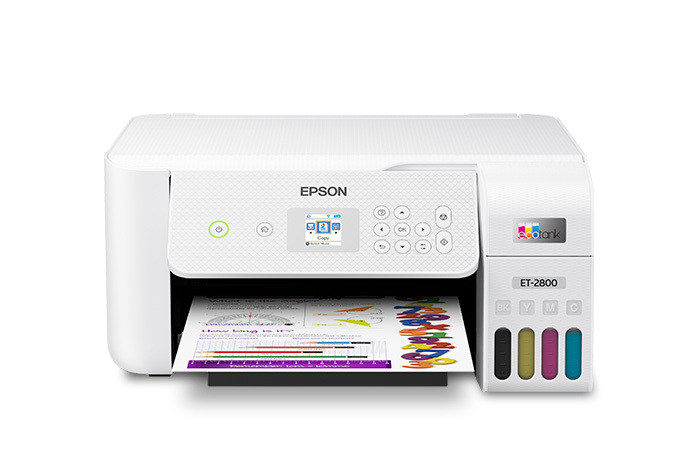
Pros: Excellent value, reliable performance, ultra-low running costs.
Cons: Basic features, lacks duplex printing.
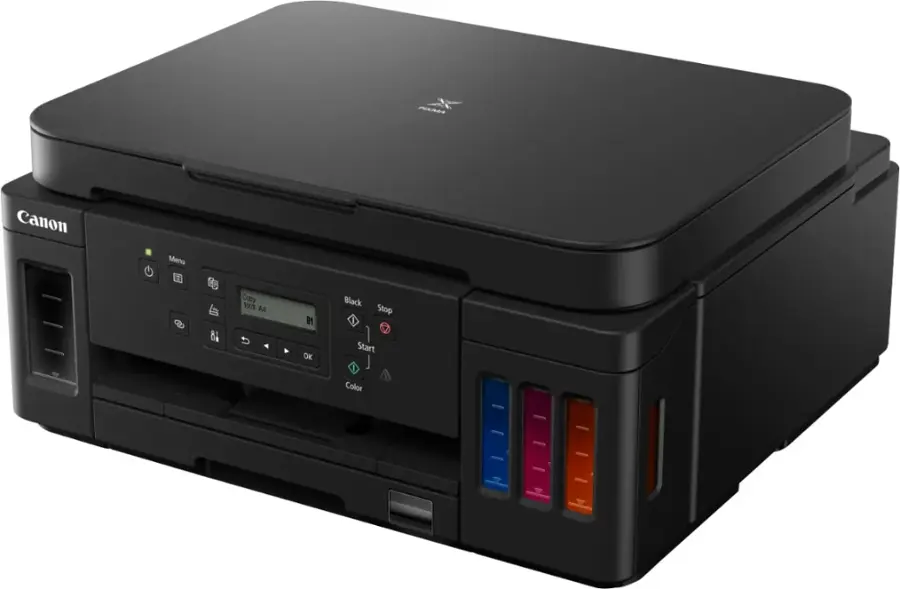
2. Canon PIXMA G6020 MegaTank
Pros: High-yield printing, great color accuracy, wireless connectivity.
Cons: Slightly bulky, no touchscreen.
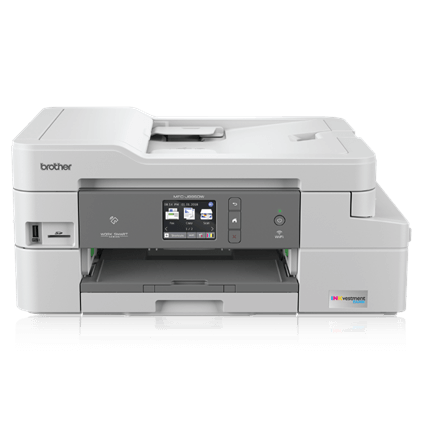
3. Brother MFC-J995DW INKvestment
Pros: Hybrid tank system, intuitive interface, good paper handling.
Cons: Slower print speed.
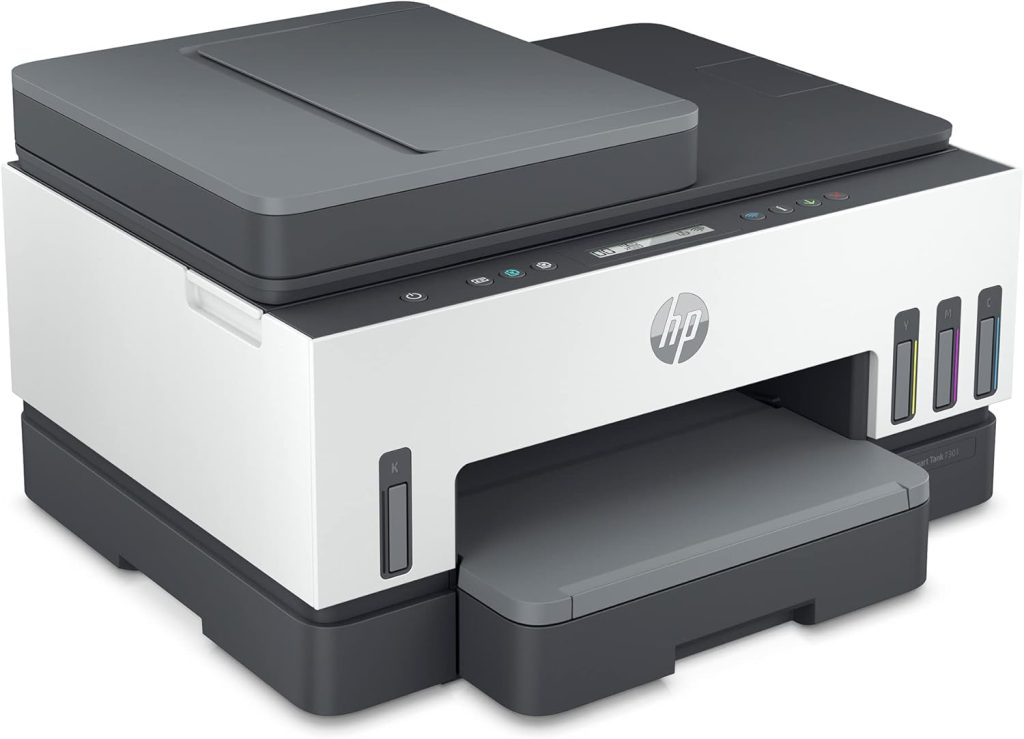
4. HP Smart Tank 7301
Pros: Smart features, strong mobile app integration.
Cons: Ink refills are brand-specific and can be tricky.
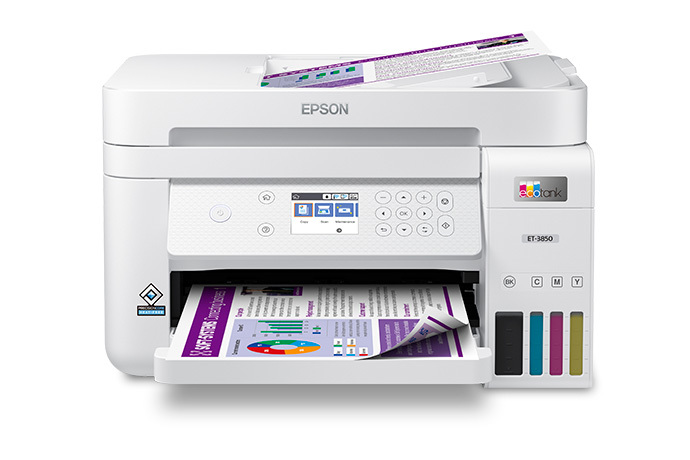
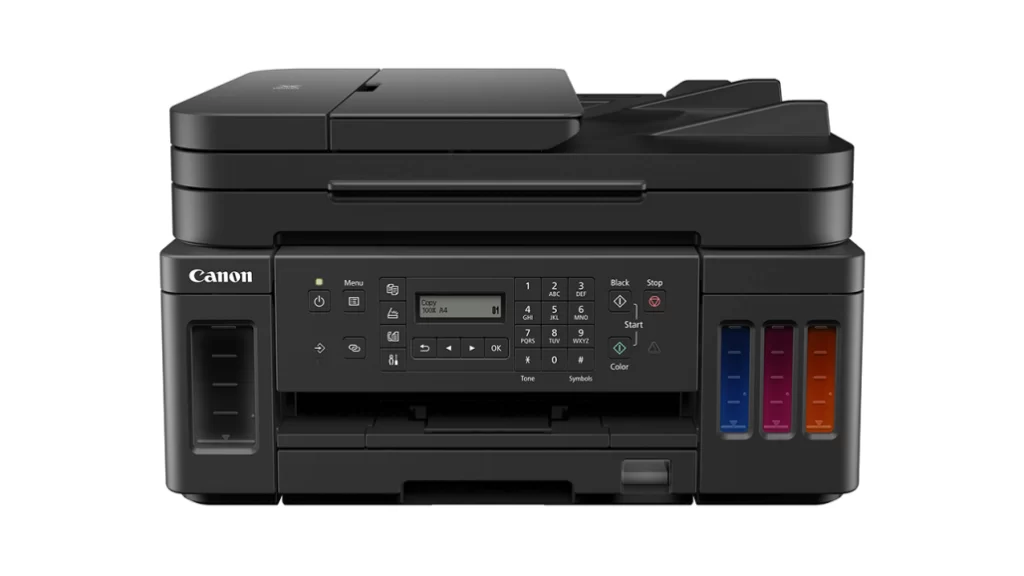
6. Canon PIXMA G7020
Pros: Duplex printing, high ink yield, fax capability.
Cons: Noisy operation.
Popular Ink Cartridge Printers
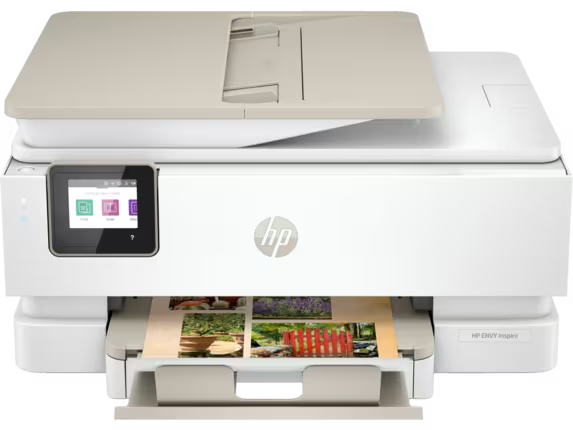
Pros: Photo-quality printing, excellent for home offices.
Cons: High ink cost if not subscribed to Instant Ink.
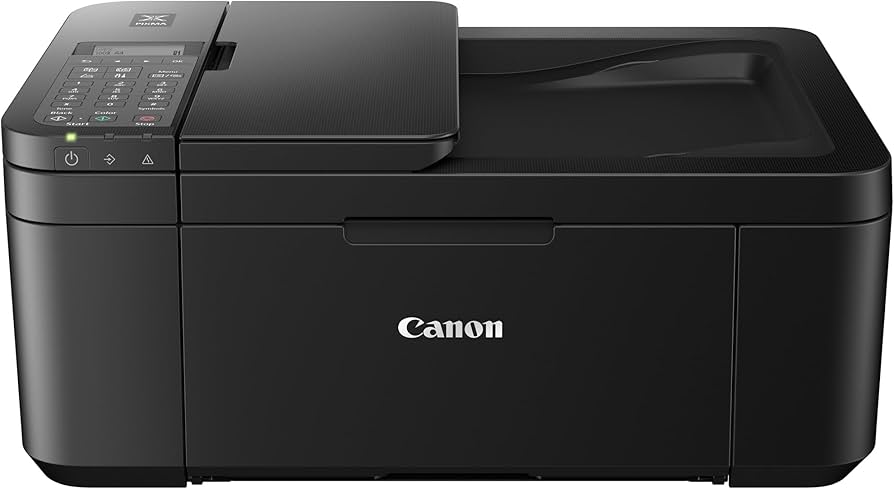
Pros: Affordable, good print quality, fax and ADF.
Cons: Slow printing, high cartridge cost.
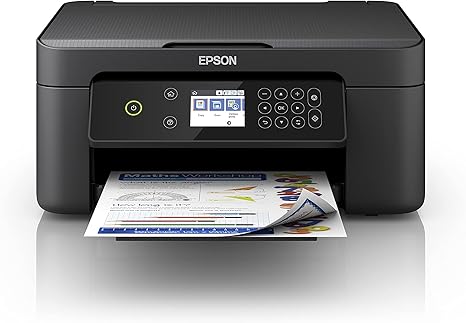
Pros: Compact design, decent photo prints.
Cons: Frequent cartridge changes, slow speed.
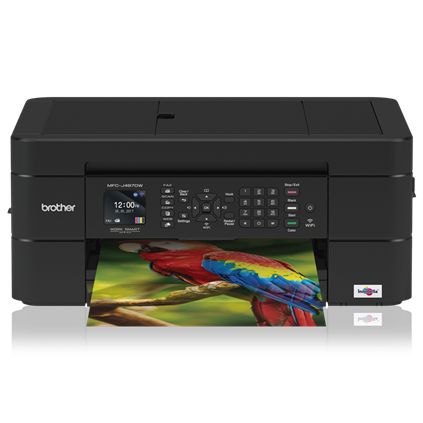
4. Brother MFC-J497DW
Pros: Affordable, decent print speed, ADF.
Cons: Subpar photo quality.
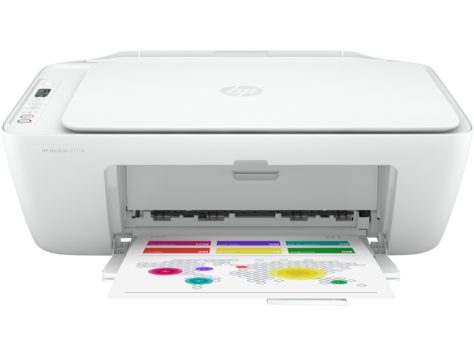
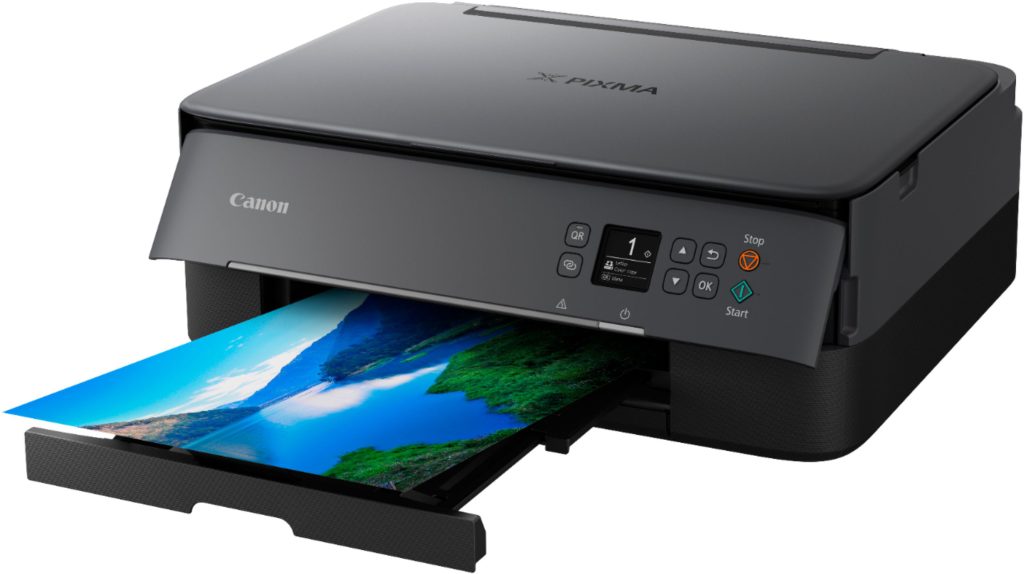
Quick Comparison Table
| Feature | Ink Tank Printer | Ink Cartridge Printer |
| Upfront Cost | $150–$400 | $50–$200 |
| Ink Cost | Low ($10–$15 per bottle) | High ($20–$50 per cartridge) |
| Page Yield | 5,000–7,000 pages | 150–300 pages |
| Cost Per Page | ~$0.008 | ~$0.20 |
| Maintenance | Periodic cleaning | Frequent cartridge change |
| Eco-Friendliness | More sustainable | More waste |
| Ideal For | High-volume printing | Casual, infrequent users |
Conclusion
In terms of cost-effectiveness, ink tank printers are undoubtedly the best choice for users who print frequently or in batches. Although the initial investment is higher, the long-term savings in ink refills, less maintenance costs, and lower environmental impact make it worthwhile. Ink cartridge printers are more suitable for low-volume users who value lower upfront costs and plug-and-play convenience.

